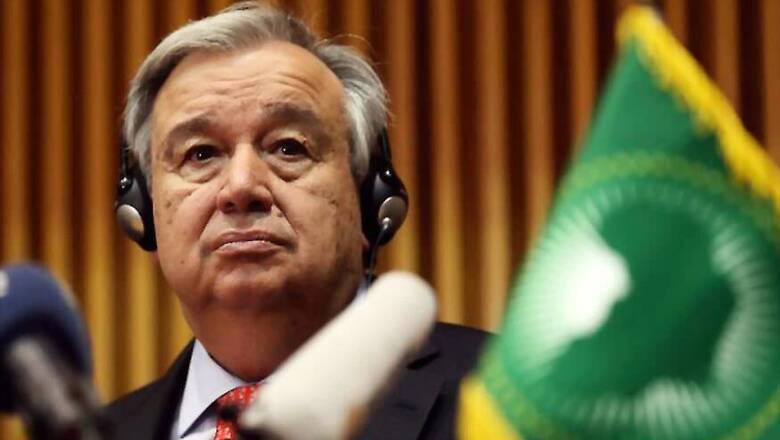
views
United Nations Secretary General Antonio Guterres on Thursday said a new vaccine against the coronavirus had to be available to everyone across the world, as an international conference got under way to raise funds for new life-saving treatments.
The virtual meeting, hosted by Britain, aims to raise $7.4 billion for immunisation programmes stalled by the pandemic, and launch a new fundraising drive to support potential COVID-19 vaccines.
In a video message, Guterres said: "A vaccine must be seen as a global public good -- a people's vaccine, which a growing number of world leaders are calling for."
There needed to be "global solidarity to ensure that every person, everywhere, has access", he added.
British Prime Minister Boris Johnson called for a "new era of global health co-operation" to "unite humanity in the fight against disease", particularly in the poorest countries.
More than 50 countries are taking part in the meeting, as well as individuals such as billionaire philanthropist Bill Gates, to raise funds for Gavi, the vaccine alliance.
Over the next five years, it wants to reboot halted programmes and provide vaccines at a much-reduced cost to some 300 million children worldwide.
Gavi and its partners will also launch a financing drive to purchase potential COVID-19 vaccines, scale-up their production and support delivery to developing nations.
The pandemic has exposed new ruptures in international cooperation, notably with US President Donald Trump's decision to pull out of the World Health Organization (WHO).
But Johnson said helping developing countries would benefit places such as Britain, which has seen more than 39,000 deaths in the coronavirus outbreak -- the second-highest in the world behind the United States.
"This support for routine immunisations will shore up poorer countries' healthcare systems to deal with coronavirus -- and so help to stop the global spread," he told reporters on Wednesday.
"This virus has shown how connected we are. We're fighting an invisible enemy. And no one is safe frankly until we are all safe."
Trump sent a recorded message to the conference, telling delegates: "As the coronavirus has shown, there are no borders. It doesn't discriminate.
"It's mean, it's nasty. But we can all take care of it together... we will work hard. We will work strong."
Microsoft founder Gates earlier said pharmaceutical companies had been working together to try to secure the required production capacity.
"It's been amazing, the pharmaceutical companies stepping up to say 'yes, even if our vaccine is not the best, we will make our factories available'," he told BBC radio.
The coronavirus pandemic has killed more than 380,000 people since it emerged in China last December, according to an AFP tally of official sources.
Stay-at-home orders were imposed across the world, causing huge economic disruption and the suspension of many routine immunisation services.
The WHO, UN children's agency UNICEF and Gavi warned last month that vaccine services were disrupted in nearly 70 countries, affecting some 80 million children under the age of one.
Polio eradication drives were suspended in dozens of countries, while measles vaccination campaigns were also put on hold in 27 countries, UNICEF said.
Guterres urged the conference to commit to finding "safe ways to continue delivering vaccinations, even as COVID-19 spreads" and to make sure that any coronavirus vaccine "reaches everyone".
Recent Gavi-supported modelling from the London School of Hygiene and Tropical Medicine estimated that for every coronavirus death prevented by halting vaccination campaigns in Africa, up to 140 people could die from vaccine-preventable diseases.
"More children in more countries are now protected against more diseases than at any point in history," said Seth Berkley, chief executive of Gavi.
"However, these historic advances in global health are now at risk of unravelling as COVID-19 causes unprecedented disruption to vaccine programmes worldwide.
"We face the very real prospect of a global resurgence of diseases like measles, polio and yellow fever, which would put us all at risk."
















Comments
0 comment